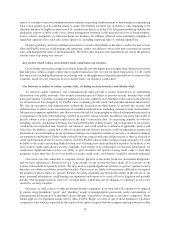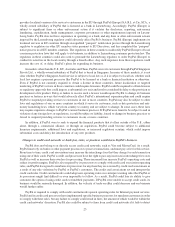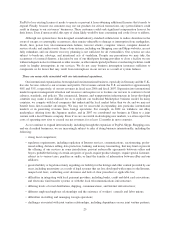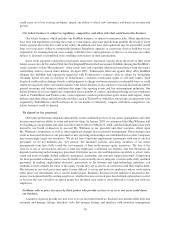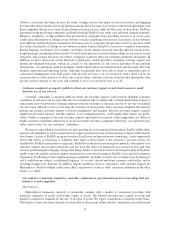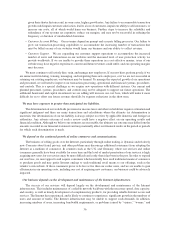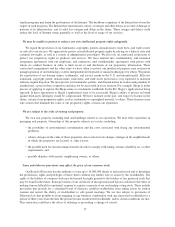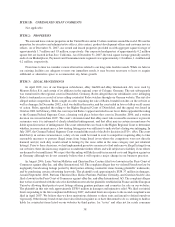eBay 2007 Annual Report Download - page 38
Download and view the complete annual report
Please find page 38 of the 2007 eBay annual report below. You can navigate through the pages in the report by either clicking on the pages listed below, or by using the keyword search tool below to find specific information within the annual report.from collecting certain taxes that were in effect prior to the enactment of the moratorium and/or one of its
extensions. If the moratorium were to expire there could be an adverse effect on our business.
In conjunction with the Streamlined Sales Tax Project — an ongoing, multi-year effort by U.S., state, and local
governments to require collection and remittance of distant sales tax by out-of-state sellers — bills have been
introduced in the U.S. Congress to overturn the Supreme Court’s Quill decision, which limits the ability of state
governments to require sellers outside of their own state to collect and remit sales taxes on goods purchased by in-
state residents. An overturning of the Quill decision without a robust small business exemption would harm our
users and our business.
We do not collect taxes on the goods or services sold by users of our services. One or more states or the federal
government or foreign countries may seek to impose a tax collection or reporting or record-keeping obligation on
companies that engage in or facilitate ecommerce. Such an obligation could be imposed by legislation intended to
improve tax compliance (and legislation to such effect has been discussed in the U.S. Congress, several states, and a
number of foreign jurisdictions) or if an eBay company was ever deemed to be the legal agent of the users of our
services by a jurisdiction in which eBay operates. One or more jurisdictions may also seek to impose tax-collection
or reporting obligations based on the location of the product or service being sold or provided in an ecommerce
transaction, regardless of where the respective users are located. Imposition of a record keeping or tax collecting
requirement could decrease seller activity on our sites and would harm our business. Foreign authorities may also
require eBay to help ensure compliance by our users with local laws regulating professional sellers, including tax
requirements. In addition, we have periodically received requests from tax authorities in many jurisdictions for
information regarding the transactions of large classes of sellers on our sites, and in some cases we have been legally
obligated to provide this data. The imposition of any requirements on us to disclose transaction records for all or a
class of sellers to tax or other regulatory authorities or to file tax forms on behalf of any sellers, especially
requirements that are imposed on us but not on alternative means of ecommerce, and any use of those records to
investigate, collect taxes from, or prosecute sellers, could decrease seller activity on our sites and harm our business.
We pay input VAT on applicable taxable purchases within the various countries in which we operate. In most
cases, we are entitled to reclaim input VAT from the various countries. However, because of our unique business
model, the application of the laws and rules that allow such reclamation is sometimes uncertain. A successful
assertion by one or more countries that we are not entitled to reclaim VAT could harm our business.
We continue to work with the relevant tax authorities and legislators to clarify eBay’s obligations under new
and emerging laws and regulations. Passage of new legislation and the imposition of additional tax or tax-related
reporting requirements could harm our users and our business. There have been, and will continue to be, substantial
ongoing costs associated with complying with the various indirect tax requirements in the numerous markets in
which eBay conducts or will conduct business.
The current regulatory environment for Voice over Internet Protocol (VoIP) is uncertain, and Skype’s
business could be harmed by new regulations or the application of existing regulations to its products.
The current regulatory environment for VoIP is uncertain and rapidly changing. Skype’s voice communica-
tions products are currently subject to few, if any, of the same regulations that apply to traditional telephony and
VoIP-based telephone replacement services. VoIP companies are generally subject to different regulatory regimes in
different countries, and in most cases are subject to lower, or no, regulatory fees and lesser, or no, specific regulatory
requirements. Regulatory agencies may require Skype to conform to rules that are difficult or impossible for it to
comply with due to the nature of its communications technologies, which could adversely affect its business. For
example, while suitable alternatives may be developed in the future, Skype is currently unable to identify the exact
geographic origin of the traffic traversing the Internet or to provide detailed calling information about computer-to-
computer communications, either of which may make complying with future regulatory requirements, such as
emergency service requirements, difficult or impossible.
Governments may impose new or increased fees, taxes, and administrative burdens on VoIP companies, or
Skype may change its product offerings in a manner that makes it become subject to telecommunications
regulations. Increased fees could include access and other charges payable to local exchange carriers to carry
and terminate traffic, contributions to federal or state Universal Service Funds in the United States and elsewhere,
28



